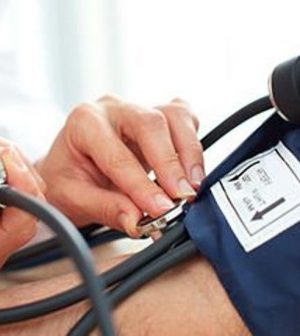- 10 Strategies to Overcome Insomnia
- Could Artificial Sweeteners Be Aging the Brain Faster?
- Techniques for Soothing Your Nervous System
- Does the Water in Your House Smell Funny? Here’s Why
- Can a Daily Dose of Apple Cider Vinegar Actually Aid Weight Loss?
- 6 Health Beverages That Can Actually Spike Your Blood Sugar
- Treatment Options for Social Anxiety Disorder
- Understanding the Connection Between Anxiety and Depression
- How Daily Prunes Can Influence Cholesterol and Inflammation
- When to Take B12 for Better Absorption and Energy
Many People With High Blood Pressure May Take a Drug That Worsens It: Study

Nearly 1 in 5 people with hypertension may be unintentionally taking a drug for another condition that causes their blood pressure to climb even higher, a new study suggests.
Left untreated or undertreated, high blood pressure will increase your risk for heart attack, stroke, kidney disease and vision problems by damaging blood vessels. Lifestyle changes such as weight loss, restricting salt intake, and/or medication can help move your blood pressure numbers back into the normal range. But asking your doctor whether any drugs you are taking for other conditions might be pushing those numbers up is worth the effort, the researchers said.
“The risk of [drugs] raising blood pressure may be simply overlooked, particularly for patients using these additional medications for many years,” said study author Dr. Timothy Anderson. He is a clinician investigator and an assistant professor of medicine at Harvard Medical School in Boston.
“We hope our article helps change this, as in many cases there are effective therapeutic alternatives to medications that may raise blood pressure or strategies to minimize risk, such as having patients monitor their home blood pressures when starting a new medication that may raise blood pressure,” Anderson said.
For the study, the researchers reviewed data from the National Health and Nutrition Examination Survey (NHANES) from 2009 to 2018. They looked at the use of the drugs known to raise blood pressure, including antidepressants, prescription-strength non-steroidal anti-inflammatory drugs (NSAIDs), steroids, hormonal medications, decongestants and weight-loss pills among people with high blood pressure.
The study found that 18.5% of adults with high blood pressure reported taking a medication that increased their blood pressure, and those who did were more likely to have uncontrolled high blood pressure if they weren’t also on blood pressure-lowering medications.
And people who were on blood pressure drugs were more likely to need higher doses to control their blood pressure if they also took drugs for other conditions that raise blood pressure, the study showed.
What should you do if you have high blood pressure?
Ask your doctor if any of your medications will affect your numbers, Anderson suggested.
“It is always wise to ask your doctor about possible interactions between new medicines [including over-the-counter medicines] and existing conditions and treatments,” he said. “This is particularly true for patients who see multiple doctors who may not always be up to date on their medication lists.”
Sometimes alternatives are available, Anderson said. For example, acetaminophen doesn’t raise blood pressure, but NSAIDs do. Both of these drugs can treat pain and reduce fever.
The new findings were published recently in the journal JAMA Internal Medicine.
Dr. Michael Goyfman is chief of cardiology at Long Island Jewish Forest Hills in New York City. He understands how these sorts of things can happen inadvertently.
“Various physicians and specialists do not necessarily talk to each other, and frequently their electronic health records do not communicate with each other,” said Goyfman, who wasn’t part of the study. “As a result, patients can be placed on a lot of medications by different providers, some of which are counterproductive to specific medical issues.”
There are ways to prevent these scenarios. “Always bring the most updated medication list to each doctor’s visit,” Goyfman recommended.
Dr. George Bakris, director of the American Heart Association’s Comprehensive Hypertension Center in Chicago, also reviewed the findings and agreed. “I would urge patients who are prescribed medications known to increase blood pressure to check their blood pressure at home after a few days,” he said.
If your blood pressure is elevated, contact your doctor to find out what to do next, Bakris advised.
More information
Learn more about how to manage high blood pressure at the American Heart Association.
SOURCES: Timothy Anderson, MD, clinician investigator, assistant professor, medicine, Harvard Medical School, Boston; Michael Goyfman MD, chief, cardiology, Long Island Jewish Forest Hills, New York City; George Bakris, MD, professor, medicine, and director, American Heart Association’s Comprehensive Hypertension Center, University of Chicago Medicine; JAMA Internal Medicine, Nov. 22, 2021
Source: HealthDay
Copyright © 2026 HealthDay. All rights reserved.










